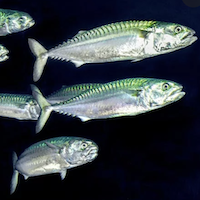Development of a predictive model for the shelf-life of Atlantic mackerel (Scomber scombrus)

Accepted: 12 November 2021
HTML: 32
All claims expressed in this article are solely those of the authors and do not necessarily represent those of their affiliated organizations, or those of the publisher, the editors and the reviewers. Any product that may be evaluated in this article or claim that may be made by its manufacturer is not guaranteed or endorsed by the publisher.
Despite its commercial value, the shelflife of the Atlantic mackerel (Scomber scombrus) during refrigerated storage was poorly investigated. In this regard, the Quality Index Method (QIM) was proposed as a suitable scoring system for freshness and quality sensorial estimation of fishery products. This study aims to develop a deterministic mathematical model based on dynamic temperatures conditions and a successive statistical analysis of the results obtained. This model will be exploited to predict the shelf-life of the Atlantic mackerel based on specific storage temperatures. A total of 60 fresh fishes were subdivided into two groups and respectively stored in ice for 12 days at a constant temperature of 1 0.5 C (Group A) and a fluctuating temperature ranging between 1 and 7 C (Group B). Microbiological analysis and sensory evaluation through the QIM were performed on each fish at regular time intervals. A critical value of 6 Log cfu/g of spoilage bacteria (mainly psychotropic) associated with a significant decay of the sensorial characteristics was exceeded after 9 days of storage for Group A and 3 days for Group B. A reliable prediction of fish freshness was obtained by modelling the QIM as a function of the spoilage bacteria behaviour. A coefficient β of correlation was determined to convert the spoilage bacteria load into a Quality Index score. The adoption of mathematical predictive models to assess microbial behaviour under different environmental conditions is an interesting tool for food industries to maximize production and reduce waste.
PAGEPress has chosen to apply the Creative Commons Attribution NonCommercial 4.0 International License (CC BY-NC 4.0) to all manuscripts to be published.


 https://doi.org/10.4081/ijfs.2022.10019
https://doi.org/10.4081/ijfs.2022.10019



